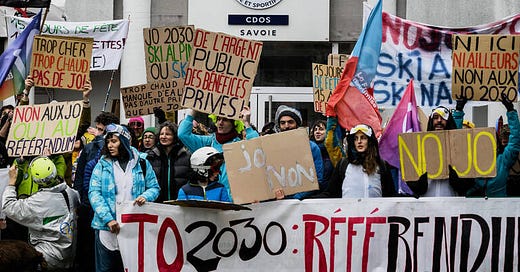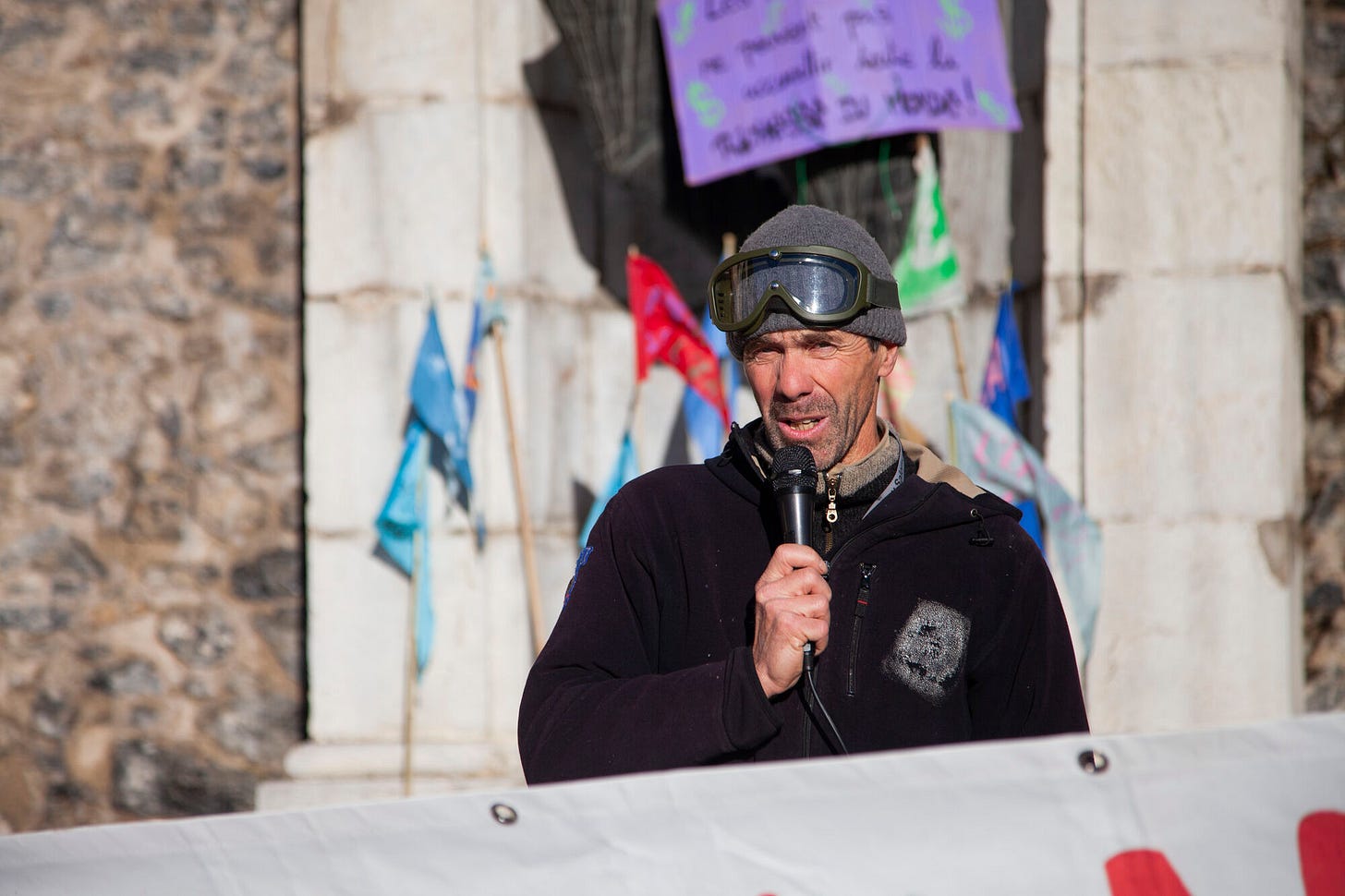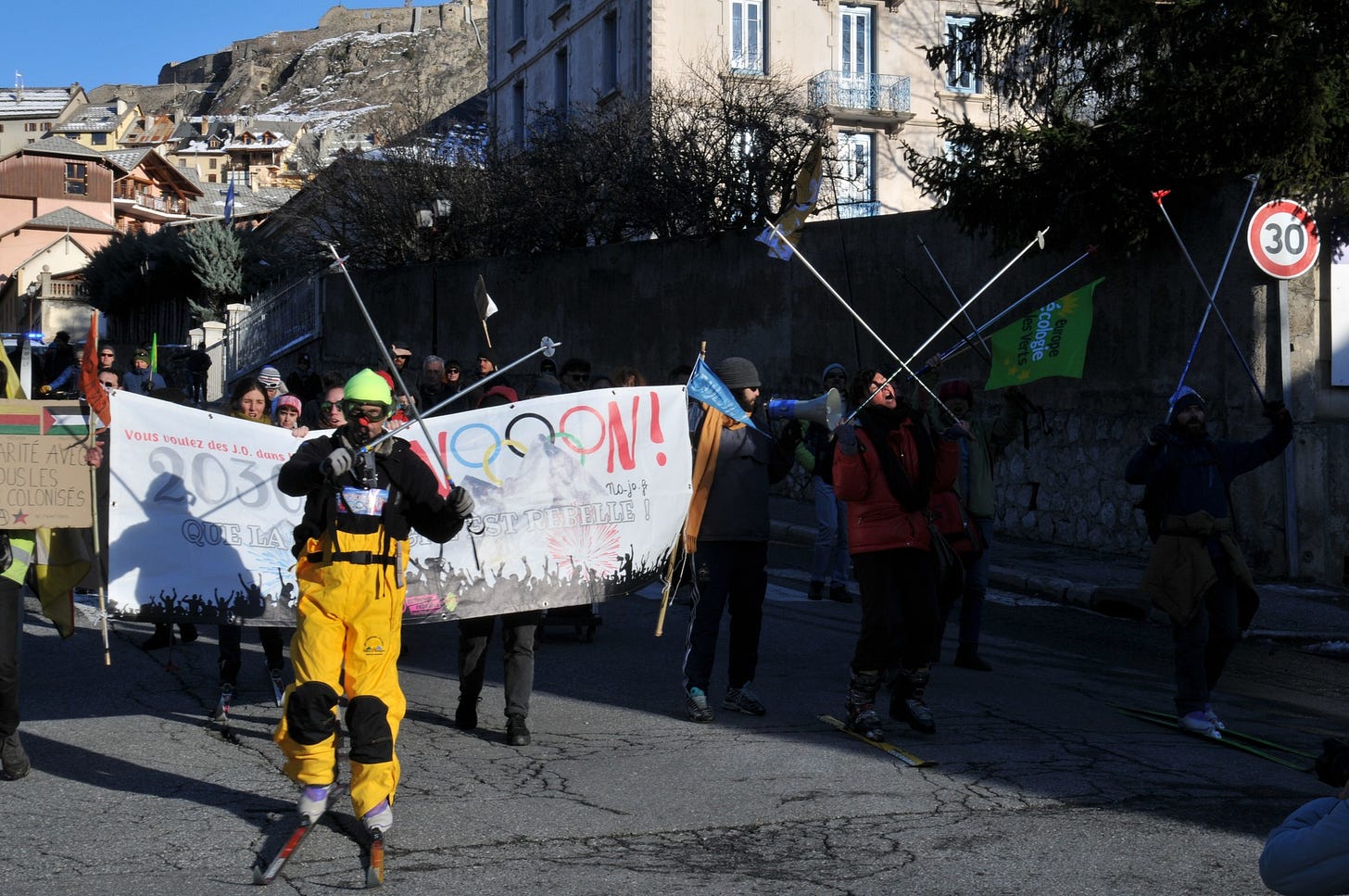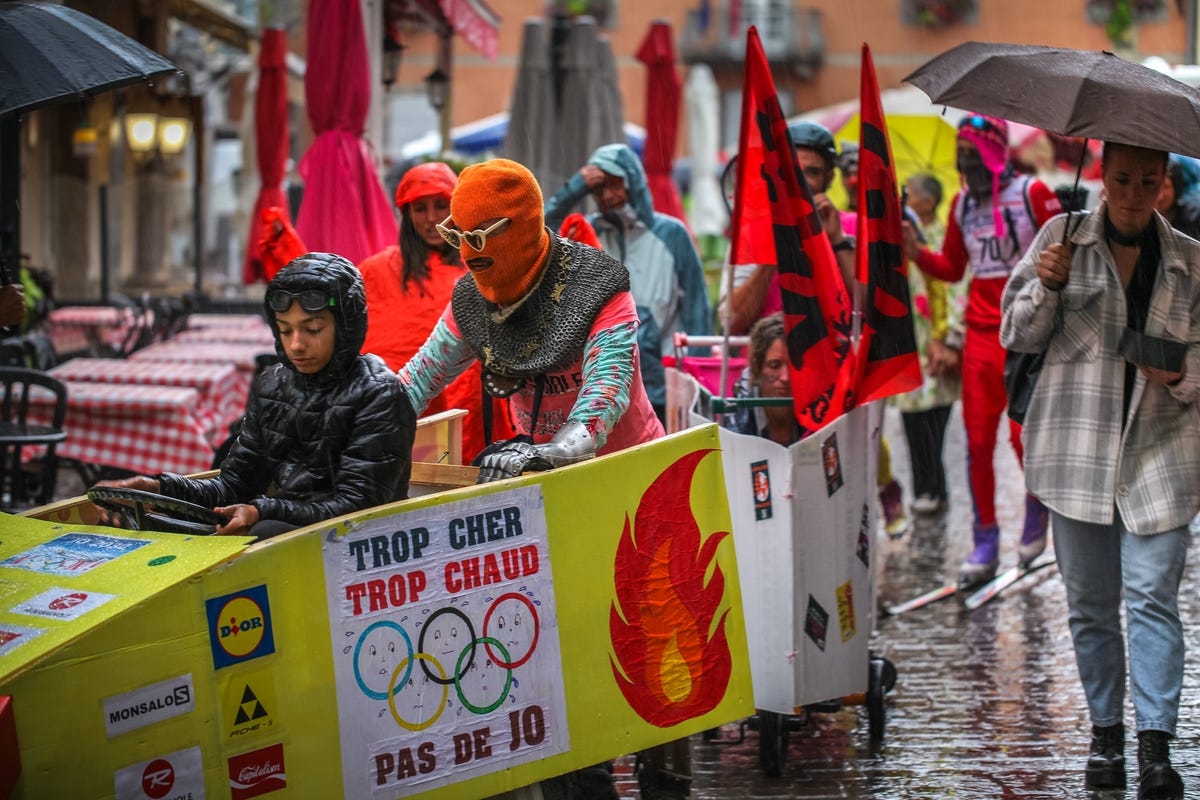“Are the Winter Olympics essential?”
An interview with cross country skier and environmental advocate Stephane Passeron of No Jo, who lives in the French Alps
“Are the Winter Olympics essential? Or is it more important to have hospitals running well and public services that work?…There’s a shift between wanting to keep skiing and the reality we’re seeing. Could we keep going and have a Winter Olympics on plastic pistes? And what state will the rest of the world be in? There’s a cognitive dissonance to all this as there are other problems which will be much more important…”
I have conflicted views about the Olympics. I still sort of love them and experience deep nostalgia for the way I felt about them as a kid, but I also question their future and their cost, social benefit, and environmental impact, especially when it comes to the Winter Games in a rapidly heating world.
So, I was super interested to speak to Stephane Passeron, a cross country skier, who competed for France internationally, but is now vehemently opposed to the Olympics and the bid by the French Alps, where he lives, to host the 2030 Winter Olympics. He founded No Jo (No aux Jeux Olympiques or No to the Olympic Games), which Valerie Paumier of Resilence Montagne, who I interviewed last year, is also involved with.
I hope you enjoy this chat. I especially love how he relates the qualities you need for sporting excellence (courage, will and enthusiasm) with the attributes necessary for the climate fight, which felt like a call to arms in many ways.
Salut Stephane, what are your favourite memories of being in the mountains when you were young?
My family lived in a small ski resort called Chaillol, in the valley of Champsaur [in the Southern French Alps]. We’d ski all day in the cold and then go for a hot chocolate with my grandma. You could ski down from the resort to where she lived at the bottom. The resort is at 1,600m, so they have already closed part of it and it only works with artificial snow.
When did you start thinking about the effects of global heating on ski resorts?
I was born in the Alps. I did ski camps when I was 14/15, then I was in the regional team, the national team, and I represented France internationally. With cross country skiing, we have a close relationship to the environment, we’re often in the forest and nature, but we’ve seen more and more problems with snowfall.
And at the same time, in terms of politics, I’ve become more and more informed. The facts are there. In winter, there is less and less snow, and I say that despite my love for it. My children are doing ski races, my eight-year-old daughter has been on the podium, holding her little skis looking very happy. To see that is quite something, it was my life, but you also think in 10 years she won’t be able to have the career that I did.
If skiing continues, it will keep going in conditions that have nothing to do with the essence of skiing. It will only be on artificial slopes, as we’ve seen in Nordic countries, making cross country ski tracks in tunnels.
What do you think about that?
There are a lot of ski competitions that look more like cycling contests. When I was a kid, I loved to take my skis and go on great trips in the forest, it was so calm. But it’s adaptation. If there is no snow in five or 10 years, our glaciers will go. If there are no more glaciers, there is not enough water for the region, it’s not going to be good.
May saw the 12th consecutive month of record-breaking heat, the speed of change is terrible and it’s all going to go very fast. And if we don't want to lose everything, we have to give up certain things. For example, for me personally, giving up taking part in international competitions and taking planes, it's a shame, but it's not possible for me now. We have to move on from that.
Do you feel it’s the job of athletes to speak up on these issues?
It’s not just up to us, it’s up to everybody. But yes, people who are directly connected to these issues like me, I’m passionate about it. It’s my way of life, I live in the mountains at 1,400m in an old house and it serves no benefit for me to stick my head in the sand.
I think athletes have a voice to bring, they have courage, will and enthusiasm and these will be essential things moving forwards. A sportsperson knows adversity and accepts it and there is not enough of that in society.
When I was at the start of a World Cup, I had 15 Norwegians who are normally stronger than the French, but I didn’t cry. You have to go in with courage. It’s tough for us, those who are passionate about skiing, on a human and economic level but I’m not going to cry about it.
Where did the idea for No Jo, the movement against hosting the 2030 Winter Olympic games in the French Alps, come from?
The Olympic Games candidacy used to be focused on a city, so Sapporo in Japan for example, but then locals started to rise up and begin questioning the cost. So here instead of focusing on Grenoble, they have spread the candidature to a whole region, from the Alps all the way to Nice so it’s difficult to protest it effectively.
And then of course we have the Olympics in Paris, which are about to happen, and we can see the opposition to the Games is posing problems for the organisers.
In the Alps, they will need to dig more artificial lakes, to make even more artificial snow, they’ll need to put in a lot of infrastructure, be that roads or increasing the capacity of the airports.
We’re trying to have reasonable discussions but those in the pro Olympic camp are refusing to meet us. And it’s a question of democracy, they said they had a survey which proved local people were in favour of the Games but according to our research the population is not happy about it at all.
When I was growing up, no one ever questioned the Olympics, everyone just loved it, but things are different now. Is this just about climate?
It's the climate, the social impacts, and the economy. The budget for the Paris Games is exploding! And there will be no snow, people are starting to realise what’s happening, but we won’t be able to bring the carbon emissions down in time, especially not with aeroplanes still circulating. We have to ask, are the Winter Olympics essential or is it more important to have hospitals running well and public services that work? And this should be up for public debate.
In the Alps, people are starting to be really impacted by the price of the property, houses have become too expensive. It’s so hot in the south of France that people are buying houses in the Alps.
This winter, there has been lots of snow above 2,500m but below 2,000m there isn’t enough snow in winter, and that’s already quite high. Studies have shown that Sapporo in Japan is the only ski resort which could host a Winter Olympics in 2080 with natural snow, that’s not far away [Lake Placid in the US and Lillehammer in Norway would be able to host until 2050 the same study showed]. For the others, it’s not possible. Instead of saying: “That’s a problem, we’ll stop,” they keep going.
Even artificial snow doesn’t work when it’s too warm, though they’re working on that in more energy and water-intensive ways. Or we’ll have plastic pistes, I’ve seen them doing that in the Pyrenees.
There’s a shift between wanting to keep skiing and the reality we’re seeing. Could we keep going and have a Winter Olympics on plastic pistes? And what state will the rest of the world be in? There’s a cognitive dissonance to all this as there are other problems which will be much more important. Will the world's population be able to feed themselves properly? Will there be more powerful cyclones, more floods, more droughts, more pandemics? They’re stuck on a boomer idea which they can’t adapt to today. It’s sad but there is no other choice, we are where we are.
What should we do?
Aim for degrowth. Get kids to do sport in their local neighbourhoods and focus on growing food locally. It’s a change of attitude and mindset but the problem for the politicians, especially in France at the moment, is the rise of the far right. Every time ecologists or people who are trying to change things suggest, for example, using less pesticides it’s framed as punitive. Politicians like selling impossible dreams to people, saying things that are enjoyable to hear.
They want to hear it’s going to be all good and our kids will still be able to ski and not to think about the scientists or others who are saying it’s going to be complicated.
When is the decision going to be made on whether to host the Winter Olympics in the French Alps?
On 24th July, just before Paris. No one has ever given an Olympic Games to a country who has not finished the previous Games, especially with so much concern over the costs of these Games.
Do you find it hard to be working on this?
I have two children, so we don’t have the time to [find it hard].
Vancouver was a candidate, but the population said they didn't want it. So, in the end there were three candidates: the Swiss, the Swedish and the French. The Swiss had to give up because they would have needed a referendum and according to surveys the public didn’t want it. And in Sweden, the Swedish government would have had to approve it, so the IOC looked to a country which was perceived to have no backlash and that was France.
For the next Games in Italy, there have been lots of protests, especially over the construction of the bobsleigh track [which I discuss with Luca Albrisi here]. The price of the 1992 Winter Games bobsleigh track at La Plagne was crazy. 15 years of debts for 15 days of party.
When I interviewed Dr Maddy Orr she said in the future the Winter Olympics might start taking place in hubs?
Yes, but the CO₂ emission for transport would still be there, and the water used for snow production. Small actions are better but not the solution. France as a country needs to reduce its emissions by five fold, we can’t keep partying as before. Sport is of course nice, but sport can be done near your house. We have to go further than these small actions.
I have a lot of respect for athletes who are no longer taking flights to international competitions. It is difficult for me as a sportsman, because people say I’ve been travelling to do my passion for decades, and now I’m telling others to stop but the situation is different now. In France we say: “Only fools don’t change their minds.”
What’s next for you Stephane?
We're going on a family bike trip because we love sport, and we love to travel and meet people. There’s always an impact but there is much less of an impact when you travel by bike.
To find out more about No Jo (No aux Jeux Olympiques), and their opposition to the 2030 Winter Olympics bid from the French Alps, head here.
This was a good plea from the French activists Resilience Montagne urging mountain people not to vote for the far right in last Sunday’s elections, in response to the fact that Alpine territories had voted overwhelmingly for the National Rally (far right) in the first round of voting. Voting for the National Rally will not “make snow fall again” or “ski lifts profitable” it will only “reinforce violence and discrimination”, it reads.
And here is an interview I did with the snowboarder and ecologist Luca Albrisi for Huck last year about the Italian opposition to the 2026 Olympics.
Other news:
It was great to speak to David Mesfin about his new film 'Wade in the Water' for Huck x the Outsiders Project. If you always thought surfing in West Africa began with Endless Summer, this film is for you as it sheds light on the continent's 1000-year-old Black surfing tradition, while hoping to inspire a new generation of Black surfers. You can read my interview and watch an exclusive edit of the film here.
Global politics is quite mad and scary at the moment but looking fwd to some rare stability at home after 14 years of pantomime and shitshow, and especially stoked to see the Greens keep Brighton and get a record four MPs in parliament.
My eldest son was born in 2010 and it’s been so depressing to only have bad stuff to say about UK politics for his entire life and that of his younger brother. Things are definitely not perfect, and Labour need to act quickly and effectively on sewage, climate, and environmental protection to name a few key things, but I don’t totally agree with the idea that “Labour and Tory are two cheeks of the same ass” even though the posters, which were all around Brighton last week, did make me laugh.
Please fwd this newsletter to anyone who you think might be interested & if you have any story tips on any of these themes pls get in touch.







Thanks! Interesting to even see a degrowth perspective in the Olympics in business-oriented Bloomberg recently https://www.bloomberg.com/opinion/articles/2024-07-06/olympics-paris-2024-only-locals-should-attend
yet when I had a chat with UNFCCC Sports for Climate Action team recently about their framework revision they didn't seem very open to this mode of thinking at all